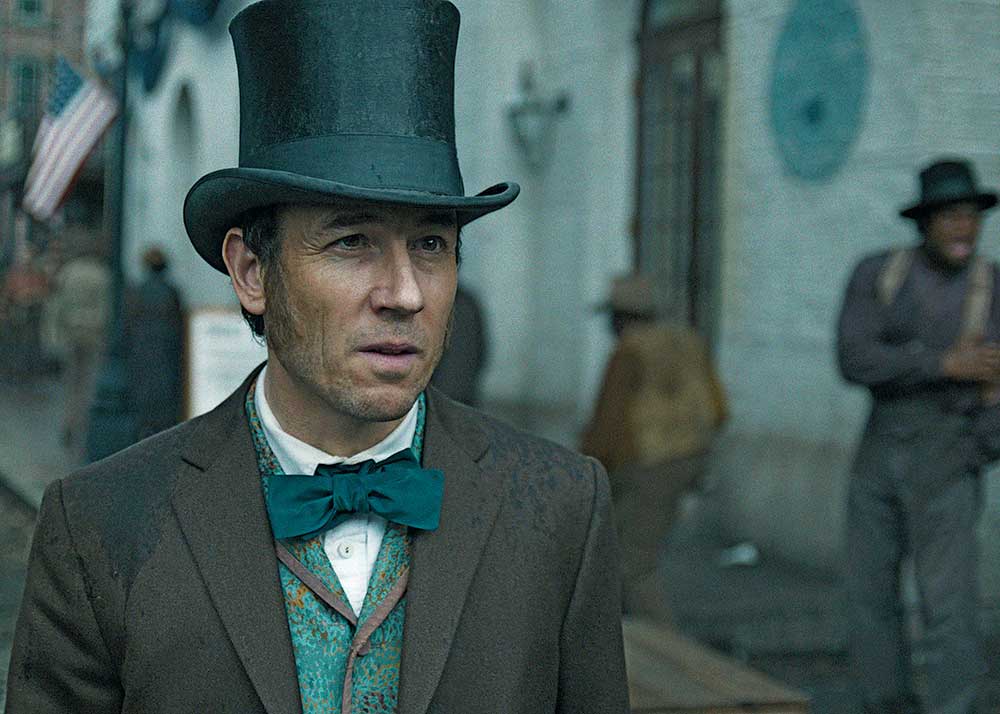The little-known story behind the conspiracy to assassinate Abraham Lincoln unfolds in Manhunt
When screenwriter Monica Beletsky (Friday Night Lights, Fargo) set out to tell the story about the conspiracy to kill Abraham Lincoln and the aftermath of the assassination, it was what she didn’t already know that fueled the seven-episode thriller. “It really intrigued me that the Lincoln assassination was not just an attack by a lone-wolf assassin that night, but that John Wilkes Booth and his conspirators also tried to take out the Secretary of State and the vice president,” explains Beletsky. The fact that Lincoln was killed only five days after General Robert E. Lee’s surrender in the Civil War added exponentially to the tragedy. “People were still in the midst of celebrating when he was shot,” says Beletsky.

Rather than approach the events through the eyes of the 16th American president, the series is an adaptation of James L. Swanson’s best-selling book Manhunt: The 12-Day Chase for Lincoln’s Killer. It was in Swanson’s book that Beletsky discovered Lincoln’s Secretary of War Edwin Stanton, played in the series by Tobias Menzies (Outlander, The Crown). “He was sort of like the head of the FBI and the Pentagon all at the same time. He and Lincoln worked side-by-side throughout most of the Civil War,” says Beletsky. “I thought it was such a dramatic premise that, from the moment Booth (played by Masters of the Air’s Anthony Boyle) shot Lincoln until Andrew Johnson was sworn in the next day, Stanton was our de facto president for about 12 hours.”

As an actor who is no stranger to period storytelling, Menzies was drawn to the human aspect of these historical characters we think we know so well. “What we were all trying to do with this show was to take this story and make these people as real as we could,” says Menzies. “It’s a very complicated political story that we’re telling, but also hopefully a very human one. These people knew each other very well, and they were thrown into a situation which they could not have imagined.”

Despite meeting his end early in the series, Lincoln remains very present thanks to flashbacks. In the hands of actor Hamish Linklater (Midnight Mass), Lincoln is portrayed as a jovial, self-made man who hid the pressures of the job behind jokes and affection. “He was very informal and that put people at their ease, so that they could bring their best selves to the table, which is what he wanted from them,” says Linklater. “I also think that the funniest people that I know often are the saddest people. There’s a description of him being the man more filled with grief than any other that person had met. I think that was true. There’s a lot of laughter that works with the grief that he bore.”

Beletsky did not want Linklater to approach the role as the man whose face graces the U.S. penny. “Of course, he’s a great orator, one of the best of all time. But he was also a husband and a father, and he was also working night and day on the Civil War with his colleagues,” says Beletsky. “I wanted to show the work and family drama of that.” Linklater admits that after that initial “pressure to live up to my hero worship of the guy,” the man behind the myth grew on him. “Once you get started, it’s like, ‘Oh my gosh, I want to fly with wings like this every day.’ I mean, what a wonderful person to get to portray,” he says. “Monica felt that it was imperative to show the friendship between Lincoln and Stanton, to show the marriage between Mary Todd (Lili Taylor) and Lincoln, and to show why the people around him loved him so much and were so fixated on finding his killer, and, then, on carrying on his legacy and making sure that reconstruction at least had its beginning.”

Although the events took place in 1865, Beletsky feels many aspects of the show are still relevant to a modern viewership. “There are echoes in our culture today,” she says. “At the time, when men had a conflict, they would meet on a hill and fight it out. It was a very gentlemanly agreement. Booth taking a gun into a theatre and committing murder like that was a really shocking, unheard-of kind of event. It was a real turning point in our culture of how conflicts were dealt with, how violence could erupt in our culture.” And, more than just a history lesson, Linklater thinks Manhunt is simply too revelatory to turn off. “I think the takeaway from the show is, ‘Oh my God, I had no idea that’s what actually happened,’ and ‘I can’t wait to watch the next episode,’ because the thing flies,” he says. “It’s a whodunit that just blossoms in front of you.”
Manhunt, streaming Friday, April 12 on Apple TV+
